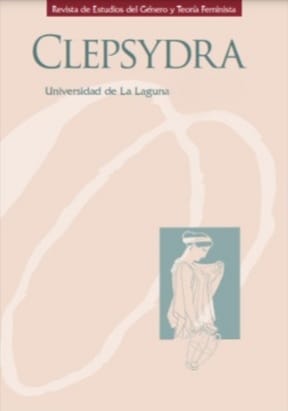The Frustration of the Ash Girl in The Barefoot Contessa: Traces of Carmen in a Hollywood Fairy Tale
Resumen
«La frustración de la Cenicienta en La condesa descalza: la huella de Carmen en un cuento de hadas hollywoodiense». La condesa descalza, que trata de la evolución personal de María Vargas, es una película transgresora, pues desmitifica el nacimiento de una diva, aunque tanto la representación de la sexualidad como la de la protagonista son tan conservadoras como en cualquier otra película convencional de estudio en Hollywood. El propósito de este artículo es realizar un estudio comparativo entre la película y una de sus mayores inspiraciones, la novela corta Carmen. Se puede considerar a María Vargas como una figura intermedia entre la pasividad de muchas heroínas de cuentos de hadas populares y el salvajismo de Carmen. María cree en las convenciones patriarcales, convirtiéndose en víctima de sus deseos. Por el contrario, Carmen resulta un agente activo que se aprovecha al máximo de la dimensión sexual a la que se la reduce, y la usa contra los hombres.
Citas
Baum, Rob. «After the ball is over: Bringing ‘Cinderella’ home». Cultural Studies, vol. 1 (2000), pp. 69-83.
Bottigheimer, Ruth B. «Fairy tales and children’s literature: A feminist perspective», in Glenn Edward Sadler (ed.), Teaching Children’s Literature: Issues, Pedagogy, Resources, New York: MLA, 1992, pp. 101-08.
—— Fairy Tales. A New History. Albany: State University of New York Press, 2009.
Butler, Judith. «Sujetos de Sexo/Género/Deseo», in Neus Carbonell and Meri Torras (eds.), Feminismos literarios, Madrid: Arco/Libros, 1999, pp. 25-76.
Carter, Angela (ed.). Angela Carter’s Book of Fairy Tales. London: Virago, 2005.
Creed, Barbara. The Monstrous-Feminine. Film, Feminism, Psychoanalysis. London: Routledge, 2007.
De Beauvoir, Simone. The Second Sex. Trans. Constance Borde. New York: Vintage, 2011.
De Lauretis, Teresa. Alice Doesn’t. Feminism, Semiotics, Cinema. Bloomington: Indiana UP, 1984.
Dick, Bernard F. Joseph Mankiewicz. Ann Arbor, MI: Twayne Publishers, 1983.
Ebert, Teresa. «Feminismo y postmodernismo de la resistencia. Diferencia-dentro/Diferencia-entre», in Neus Carbonell and Meri Torras (eds.), Feminismos literarios, Madrid: Arco/Libros, 1999, pp. 199-232.
Gould, Evlyn. The Fate of Carmen. Baltimore: The Johns Hopkins UP, 1996.
Haase, Donald. «Feminist fairy-tale scholarship», in Donald Haase (ed.), Fairy Tales and Feminism: New Approaches, Detroit: Wayne State UP, 2004, pp. 1-36.
Humm, Maggie. Feminism and Film. Edinburgh: Edinburgh UP, 1997.
Kaplan, E. Ann. Women and Film. Both Sides of the Camera. New York: Methuen, 1983.
López Jiménez, Luis and López Esteve, Luis-Eduardo. «Introduction», in Prosper Mérimée, Carmen, Madrid: Cátedra, 2003, pp. 9-84.
Mankiewicz, Joseph Leo (dir.). The Barefoot Contessa. Metro-Goldwyn-Mayer, 1954.
Mérimée, Prosper. Carmen. Trans. Luis López Jiménez and Luis-Eduardo López Esteve, Madrid: Cátedra, 2003.
Radner, Hilary. Neo-Feminist Cinema: Girly Films, Chick Flicks, and Consumer Culture. New York: Routledge, 2011.
Radner, Hilary and Stringer, Rebecca. « Introduction. ‘Re-Vision?’: Feminist film criticism in the twenty-first century», in Feminism at the Movies. Understanding Gender in Contemporary Popular Cinema, New York: Routledge, 2011, pp. 1-10.
Server, Lee. Ava Gardner: «Love is Nothing». New York: St. Martin’s Griffin, 2007.
Stein, Louise K. «Before the Latin tinge: Spanish music and the ‘Spanish idiom’ in the United States, 1778-1940», in Richard L. Kagan (ed.), Spain in America: The History of Hispanism in the United States, Chicago: U of Illinois P, 2002, pp. 221-23.
Tasker, Yvonne. «Enchanted (2007) by Postfeminism: Gender, irony, and the new romantic comedy», in Hilary Radner and Rebecca Stringer (eds.), Feminism at the Movies. Understanding Gender in Contemporary Popular Cinema, New York: Routledge, 2011, pp. 67-79.
Thornham, Sue. «Postmodernism and Feminism», in Stuart Sim (ed.), The Routledge Companion to Postmodernism, New York: Routledge, 2005, pp. 24-34.
Zipes, Jack. Don’t Bet on the Prince. Contemporary Feminist Fairy Tales in North America and England. New York: Routledge, 2012

Esta obra está bajo licencia internacional Creative Commons Reconocimiento-NoComercial-SinObrasDerivadas 4.0.
Los artículos son propiedad de sus respectivos autores y autoras, quienes conceden libremente a la revista el derecho de primera publicación.


